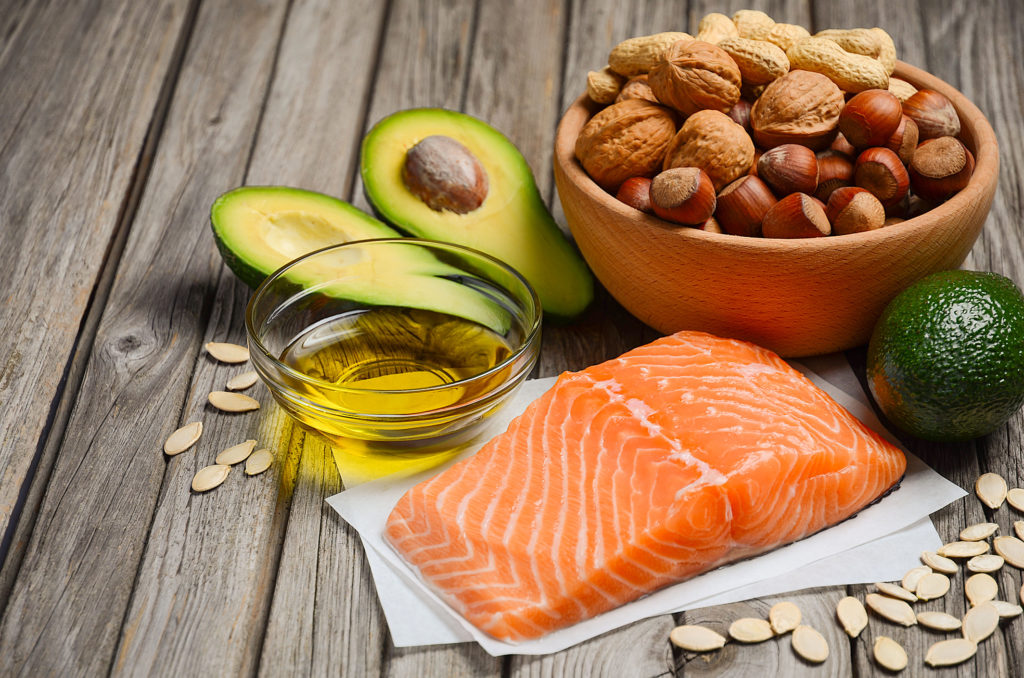Ten Superfoods You May Want to Add to Your Diet

March is National Nutrition Month, so we thought we’d take a look at some foods that provide some important health benefits (i.e., “superfoods”). Due to certain dietary restrictions or choices, you may not be able to include all of these, but most people can incorporate at least some of these superfoods into their diets. Be sure and check with your physician or nutritionist to find out if these foods would benefit you.
Wild Alaskan Salmon
Salmon is a food very high in omega-3 fatty acids. These essential fats have a wealth of benefits, including slowing the progression of age-related macular degeneration and potentially reducing the risk for Alzheimer’s disease. According to a study published in Neurology, eating foods high in omega-3 fatty acids is linked with lower levels of beta-amyloid protein, which is linked with Alzheimer’s disease. In an earlier study published in Neurology, low omega-3 levels were linked with smaller brain size and a poorer performance on memory tests. Omega-3s are also powerful anti-inflammatory agents that have been shown to ease joint pain and stiffness and depression, two ailments that affect seniors in disproportionately high numbers.
Blueberries
Blueberries are powerful antioxidants, which protect the body from the damage caused by free radicals, which can cause damage to the cells in your body. Too many free radicals in the body have been linked to a wide variety of maladies including cancer, heart disease, and some degenerative diseases such as Alzheimer’s disease.
Kale
Almost all leafy greens are good for you, but kale is king. Like many of the foods listed here, kale is a powerful antioxidant and anti-inflammatory food. It is rich in iron, Vitamins A, C and K, and calcium, making it another great alternative to dairy foods for bone health.
Avocados
Avocados are packed with nutrients and although they are high in fat, the fat found in “alligator pears” is actually good for you. In an article published in the Journal of the American Heart Association, researchers discovered that people who included an avocado in their diet had lower overall cholesterol levels, lower LDL (“bad” cholesterol) levels, and lower triglyceride levels. Avocados have also been shown to increase HDL (“good” cholesterol) levels.
Tomatoes
Tomatoes are rich with lycopene, which has been shown to help prevent atherosclerosis (hardening of the arteries) and numerous cancers. Like blueberries, tomatoes are also rich in antioxidants. And unlike many other fruits and vegetables, cooking tomatoes doesn’t lessen their health benefits. In fact, cooking tomatoes actually increases the level of phytochemicals they contain.
Eggs
This may come as a surprise to many, since eggs have gotten such a bad rap. Eggs are high in dietary cholesterol. That much is true. But there is no evidence that shows that eating eggs raises your serum cholesterol (the number you get from your doctor after a blood test). The Framingham Heart Study examined the serum cholesterol in high versus low egg consumption and found no significant difference in either men or women. In fact, eggs are extremely nutrient-rich and are a source of high-quality protein. According to a study by the Harvard School of Public Health, regular consumption of eggs may help prevent blood clots, stroke, and heart attacks. Eggs are also high in omega-3s.
Almonds
Almonds are very high in calcium, something particularly important for older Americans. This makes almonds an excellent choice for those who are lactose intolerant or who simply choose not to eat dairy products. Almonds are also high in Vitamin E and are a good source of protein.
Turmeric
This yellow spice, typically associated with Indian cuisine, has been shown to have powerful health benefits. It has strong anti-inflammatory and antioxidant properties, and has been shown in numerous studies to help prevent and treat cancer.
Chia seeds
Those little seeds that adorn the famous Chia Pets are very nutrient dense. They are loaded with fiber, high in protein, antioxidants and omega-3s. They are also a great source of calcium, manganese, magnesium and phosphorous.
Green/White Tea
For those who prefer to drink their nutrients, you can’t do much better than green or white tea. The only difference between the two is that white tea is harvested at a younger age than green tea and may, therefore, possess greater amounts of antioxidants, one of its chief health benefits. Studies have also shown green tea may help prevent cancer and improve brain health.
![LifeCare Advocates [logo]](https://www.lcadvocates.com/wp-content/uploads/sites/270/2017/11/logo.png)